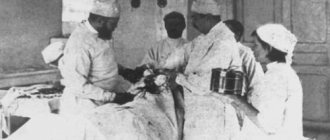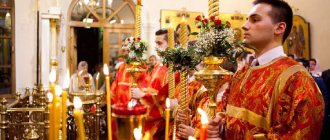Who is a sexton?
In the modern Orthodox Church, a sexton is a kind of servant. His main task is logistical support, that is, he must ensure the correct execution of the service. In the modern world, the sexton prepares robes for the clergy of the temple, at the same time it is he who is responsible for preparing many vessels for the service. Data The temple servant lights the censer and candles in the altar. Consequently, he must make sure that all the nuances are completed so that the clergyman can conduct the service without fuss and various problems, that is, in human language: “Without a hitch.” In many churches over the past few years it has become relevant that sextons play a certain role as readers, therefore, they thus help the work of the choir, that is, the choir. At the moment when services or other activities are not taking place in the temple, it is the sexton who is responsible for the cleanliness and safety of all equipment that is located near the altar or on the territory of the temple.
It is worth noting that often these servants of the Most High are men who were previously righteous parishioners. At the same time, situations very often occur when, after a few years, the children of certain parishioners of a certain church become altar servers. Worshipers claim that if there are not enough men in the parish church to elect them for altar service, then the church ministers can choose the most pious women from among the parishioners, but at the same time they must be of advanced age. Therefore, it can be said that a young girl can under no circumstances be a sexton, especially this rule applies to the Russian Church, since in other powers this act is permissible. It is also important for Orthodox believers to know that in monasteries there are under no circumstances male sextons, since the altar girls who serve there are women. However, according to church canons, women are strictly forbidden to enter the altar, however, exceptions are made for women who live in the monastery and serve as altar attendants. Such acts were committed due to the fact that the Russian Church is characterized by a certain categorical nature.
Many people claim that in various churches that belong to the Patriarchate of Antioch, one can meet sextons near the altar, who are female and at the same time young. Thus, many witnesses say that in the Patriarchate of Antioch you can find girls dressed in surplice (the attire of sextons), therefore, they are sextons of the temple. However, such an act is unthinkable for the Russian Orthodox Christian Church.
Etymology
The word “sexton” itself is an unofficial designation for a clergyman, who is also called “paramonar” (Greek term). The latter, more correct option was forced out of use in the Russian Church and was practically forgotten. It is translated as “gatekeeper,” although the modern functions of sextons hardly correspond to this definition. But we will talk about the history and evolution of the sexton service a little later.
Sexton - about the spiritual illnesses of sextons
Sexton - about the spiritual illnesses of sextons
(interview with Archpriest Alexy Sorokin)
- Father Alexy, no one argues that altar servers are needed. It is clear that they are simply necessary. Another thing is the dangers that altar servers are exposed to while being in the most important place of the temple...
– In fact, we are all susceptible to such a danger – getting used to the sacred – priests, altar servers, singers, cleaners... In my opinion, everyone who works in the church runs the risk of losing the sense of the sacred, the holy - of starting to perceive the temple not as a place of service, but as a place of work, or friendly gatherings, or gossip - you never know what! And, by the way, about the main place of the temple: isn’t every centimeter of it the main one? I remember that the repentant publican did not stand in the Holy of Holies at all, but even in the vestibule...
Now about the altar servers. Yes, a sexton is needed. Priests need them first of all, “for it is unfitting for us to leave the word of God and worry about tables” (Acts 6:2). Although these words of Holy Scripture mostly concerned deacons, the essence is the same: the main work of a priest is prayer. And it is unlikely that prayer will be intensified if the priest has to do without the help of those same sextons (altar boys): he must light the censer, warm the water on time, and simply constantly maintain order. So, in my opinion, the main task of the sexton should be considered to be his assistance in the prayers of the priest and, consequently, the parishioners, the entire community. Of course, this assistance implies sacrifice. And also concentration: after all, while helping at the altar, let’s say, physically, physically, the sexton should not forget about the spiritual side. That is, he himself must pray to the best of his ability - otherwise there will be no great benefit from his presence at the altar. Rather, harm – to one’s own soul in the first place.
This is very well stated in the preface to the wonderful book “Repentance is Left to Us” by Abbot Nikon (Vorobiev). Let’s remember: “Father loved to serve and served with concentration, concentration, and with all his heart, which was felt by everyone. He performed the service simply, restrainedly, naturally. He could not stand artistry or any pretentiousness in performing worship, reading, singing, and made comments to the “artists”...
He forbade anyone to enter the altar, or even more so to stand in it unless absolutely necessary. At the altar, the priest never said anything other than the most necessary, and he did not allow others to do this. I never confessed during the Liturgy: I conducted confession either before the Liturgy, or the evening before (in Lent). He said: a person should pray during the Liturgy, and not wait in line to confess.”
It seems to me that such a strict and reverent attitude of Abbot Nikon towards church services - and to prayer at the altar in particular - deserves the closest attention and imitation on our part. Indeed, unnecessary conversations, inactive, idle presence in the altar, and in the entire church, should not be allowed - this is a profanation of Christianity.
“But there are quite a lot of young people, even boys, in the altars of our churches. Don't you think that the time has long passed when any male person entering a temple was automatically considered a potential priest or clergyman, and therefore he was easily introduced into the sanctum sanctorum?
- Seems. That is why we demand that young altar servers learn piety. Due to their age, and upbringing too, they cannot do without difficulties: there are completely useless, stupid conflicts, and, alas, there are also violations of reverent silence. That's why sometimes you have to be strict. But, in addition to severity, it is necessary - I want to draw attention to this - education. The whole community, and not just one priest, can and should engage in such education. If the service in the temple takes place in reverent silence, then the order itself forces the youth in the altar to adhere to strict rules. If at the service they whisper, discuss news and old age, push and quarrel, if the church “box” becomes a gathering place for a bustling queue (this most often happens before the removal of the Chalice, during the reading of prayers for Communion - at the most important moment of the service!), then this , alas, provokes young people to inappropriate behavior. Then this disgusting pharisaism appears: to come out of the altar with an important air, pushing aside the parishioners, walk around the temple, go back into the altar, close the doors and, considering the altar as something like “your room,” continue making jokes or something else.
In addition, the help of senior sextons is also important. A mature person, a sincere believer, serves at the altar, as I am constantly convinced, very responsibly and reverently. And it is really easier for a priest to pray when such people help him. So the young should learn from the elders.
And priests, I think, should be more attentive to those boys and young men who are offered to help at the altar. In my opinion, it is not worth introducing into the holy of holies any boy who catches your eye in the church. This is dangerous - both for the order of service and for this boy himself in the future.
– Are there examples of altar servers who make you happy?
- Of course have. To be honest, what struck me most was not the ministers, but the altar servers: old maidens who once helped in the Vologda Cathedral. The reverence with which they treated their service, I am sure, can be learned by many, including clergy. This is truly an example of serving Christ with your heart!
– What advice would you give to young people helping at the altar?
- Not I, but the Apostle Paul gives advice: “Be careful how dangerously you walk” - “Take heed therefore and walk carefully, not as fools, but as wise...” (Eph. 5:15).
Pyotr Davydov spoke with Archpriest Alexy Sorokin
Similar
History of the sextons' service
The gatekeeper, that is, the minister of the ancient Christian church, whose functions are performed by the modern sexton, is a person whose duties included maintaining order during the service. At a certain time, he closed the gates of the temple so that none of the uninitiated - the catechumens, those of other faiths, heretics, excommunicated or penitents - could penetrate the Eucharist, in which only baptized Christians who are not subject to penance can take part. In addition, sextons in ancient times took care of the safety of temple property, its lighting, and monitored the behavior of parishioners in order to prevent theft, sacrilege, and so on. In special places, such as Golgotha or Bethlehem, sextons were constantly on duty to guard places of mass pilgrimage and provide assistance to pilgrims.
How to become a sexton
In ancient times, “ordaining a paramonar” was a special rank. The ceremony had the character of consecration, that is, full initiation into church service. Today this procedure is rarely reproduced. The duties of a sexton these days are trivial enough to require the usual verbal permission of the rector of the temple. He also blesses the altar boy to wear the surplice. However, when a bishop visits a parish, he must also receive a bishop’s blessing. Many sextons in our time also ask for permission to wear a cassock, which, in principle, is not a church tradition, but is in the nature of a local custom. But to become a sexton, you don't need anything special. It is enough simply to be a regular parishioner of the temple, participate in church life and have a good reputation among members of the community. In this case, you can ask the abbot for his blessing to join the sexton service.
It is important to understand that a modern sexton is most often a layman who is entrusted with special obedience in the temple, and not a clergyman. In large churches, as a rule, some altar servers are full-time, that is, professional. Their work is supervised and organized by the senior sexton in the temple. Such people perform their ministry not only at the call of their hearts and the blessing of their confessor, but also according to an employment contract, and accordingly receive a salary. For them, sextonism is associated with daily attendance at divine services. Other altar servers appear at services only on holidays, Sundays and when they themselves want to.








